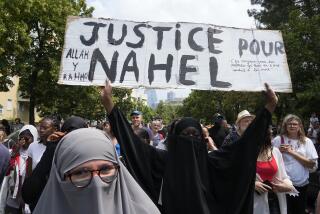A Nice Place in a Bad Neighborhood? : Lifestyle: Unlike the countries around it, Tunisia is an oasis of calm. But the push to reconcile Islam and modernity has its price.
- Share via
TUNIS, Tunisia — In a gesture that would be unthinkable--even suicidal--for an Arab leader today, President Habib Bourguiba went on live television almost 30 years ago in the midst of Ramadan, the holy month of fasting for Muslims, and drank a full glass of water before the eyes of a shocked nation.
Bourguiba had already stunned orthodox Muslims in the mid-1950s by becoming the first Arab leader to abolish polygamy, promote women’s rights, introduce birth control and establish mass education.
To those who considered themselves true believers, his policies were nothing less than an attack on the Koran, the sacred book of Islam, which permits Muslims to take four wives and protects a man’s right to unilateral divorce.
Bourguiba, who is now in his 90s and living quietly after being retired in a 1987 palace coup, always maintained there was nothing un-Islamic in his policies. His intent, he said, was to reconcile Islam and modernity so that religion reflected the thinking of the 20th Century, not the Middle Ages.
With the spread of Islamic extremism through much of the Middle East in recent years, however, men have been marked for death for far less radical views.
No other Arab government, before or since, has dared pursue a fundamental reform of the rights of women or question, as a matter of policy, some of the more archaic teachings of the Koran.
But two generations of Tunisians have grown up--first under Bourguiba and now under his successor, Zine Abidine ben Ali, a tough law-and-order former interior minister--as the beneficiaries of the country’s “personal rights code,” and few would turn back the clock.
The 8.5 million residents of this former French protectorate on the African coast of the Mediterranean like to say that Tunisia is a nice place in a bad neighborhood. To the east is Moammar Kadafi’s Libya, to the west Algeria, where a three-year war waged by Islamic extremists has claimed more than 20,000 lives.
And here, in an oasis of calm, is a place seemingly far removed from all the symbols and tensions of religious fundamentalism that test the fiber of Arab nations. It is a calm born of national economic progress and an official intolerance of the trappings of fundamentalism.
Cab drivers are forbidden to wear scraggly beards, and any woman who shows up at her government job veiled is sent home for the day. Unlike every Arab country, except Morocco, Friday, the Muslims’ holy day, is a regular workday in Tunisia; Sunday is the day of rest.
The mosques are indeed full at times of prayer but no fiery sermons pour forth, and no wild-eyed sheiks with amplifiers harangue the masses on crowded streets as they do in Egypt. Anyone who crosses the line between religious Islam and political Islam ends up in jail.
In the Cafe de Paris and the other sidewalk cafes on Bourguiba Avenue, a handsome boulevard where the stone-faced interior ministry with its barred windows seems out of place, young unbearded men in Western attire idle away time over coffee, talking of jobs, soccer and beach vacations, but never religion.
For street dress, Tunisian women favor blouses and skirts, some short enough to dazzle the imaginations of visitors from the Persian Gulf. Most women look with horror upon the lives of their shrouded counterparts in the Gulf and on the Arabian Peninsula.
*
The cost of such political tranquillity has been high. Human-rights organizations estimate that as many as 8,000 Islamic activists in Tunisia are in jail, and Amnesty International has reported that eight Tunisians died under torture in 1991 and 1992.
But the vast majority of Tunisians appear to support Ben Ali’s tough policy against extremists and find little worth importing from radical Islamic movements in Iran, Egypt or Algeria.
There are no covert movements advocating the formation of an Islamic state, no underground campaigns to loosen the government’s tight control of the press and other forums of opinion.
Ben Ali, who appears genuinely popular with most Tunisians, manipulates democracy like a water spigot, increasing the flow here, cutting back there. The security apparatus, Western diplomats said, is not abusive to those who stay clear of religious activism.
“I’ll tell you what I think,” said a male Tunis high school teacher. “I think to have a few thousand fundamentalists in jail is a small price to pay for stability and calm. Their message doesn’t offer me anything I want. Besides, who needs more than one wife anyway?”
The lesson in Tunisia for other Arab countries then may be that when a government can give rise to a middle class, improve the lot of the poor and engender a sense of national hope--all of which Tunisia has done--and at the same time deals harshly with zealots, Islamic fundamentalism can be defeated, or at least effectively silenced.
Blessed with a manageable-sized population and a free-market economy, Tunisia has averaged an annual 5% growth over the past five years. Per capita income doubled in real terms between 1956 and 1991 to $3,850. One-third of the national budget is spent on education, and the literacy rate has risen to 65%. An active family-planning program has reduced the population growth rate to 1.9%--the lowest in the Arab world. Life expectancy is among the highest in the region: 67 years for men, 70 for women.
Women have achieved so much independence and prominence over the past few decades--in every position from judgeships to business executives--that their rights are no longer even debated. In the past 10 years, the proportion of women civil-service managers has risen to 24% and that of female university graduates to 40%.
Tunisian women cannot marry before the age of 17 and, under a law designed to prevent them from being coerced into marriage by male relatives, they must have their mother’s consent between the ages of 17 to 20.
Their rights to inheritance and alimony, in case of divorce, are protected, and when questions were raised recently about the Islamic propriety of abortion, editors at Info Credit, a woman’s business magazine, searched through the Koran and announced they had found verses that do indeed sanction abortion.
*
Like many Arab leaders, Ben Ali’s first response to radical Islam was to try to deal with agitators through reason and tolerance. He pardoned a group of extremists whom Bourguiba had planned to execute and opened a dialogue with the radical Islamic organization An Nahdha (Renewal).
That approach has failed everywhere else that it has been tried in the Middle East, leading to a consensus among Arab leaders from Saudi Arabia to Tunisia that the only way to deal with Islamist extremists is to crush them.
“President [Hosni] Mubarak exercised great patience at first, hoping reason would prevail and it didn’t,” said Nabil Osman, director of Egypt’s State Information Service, justifying the crackdown on Islamic extremists there.
In Algeria, the government legalized the Islamic Salvation Front and soon became embroiled in civil war.
And in Morocco, King Hassan II told a journalist in March, “Fundamentalists preach their ideology because they consider Islam the elevator to take power. The day I see a fundamentalist who preaches religion for the love of God, then I’ll say, ‘Fine, let’s listen.’ But so far, I haven’t heard that.”
Whatever appeal An Nahdha might have had to mainstream Tunisians was lost in February, 1991, when, during the tensions over the Persian Gulf War, its supporters bound and burned two guards in a firebomb attack on a branch office of Tunisia’s dominant political party.
Tunisians, thinking themselves immune from such violence, were aghast. The government tried the fire bombers and their supporters in a military court--one of the guards had died in the attack--and sentenced 265 of the Islamists to prison terms ranging from one year to life. The leader of An Nahdha, Rachid Ghannouchi, has since fled into exile in London.
Justifying the government’s tough measures, Ben Ali declared, “Religious obscurantism engenders terrorism.”
More to Read
Sign up for Essential California
The most important California stories and recommendations in your inbox every morning.
You may occasionally receive promotional content from the Los Angeles Times.













